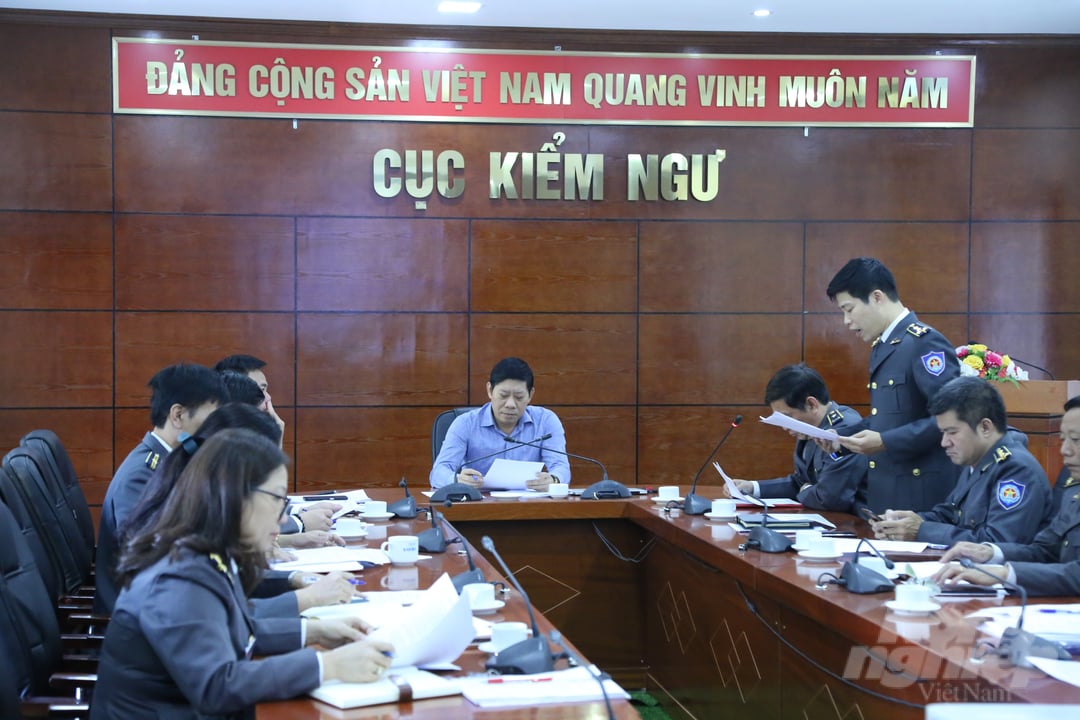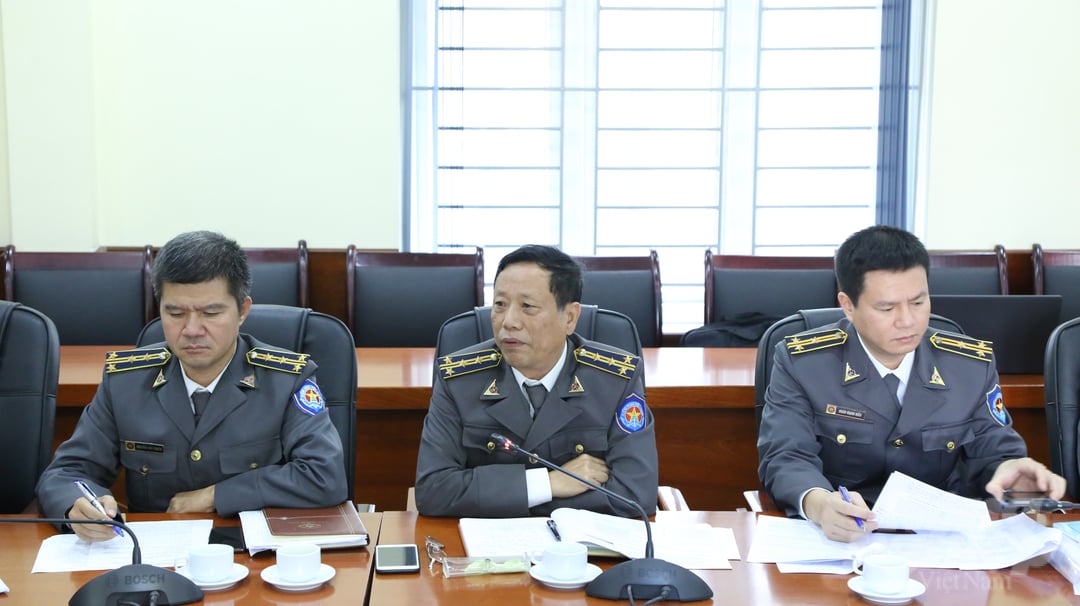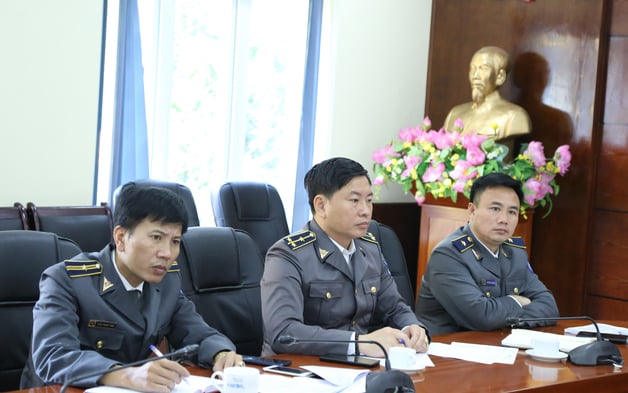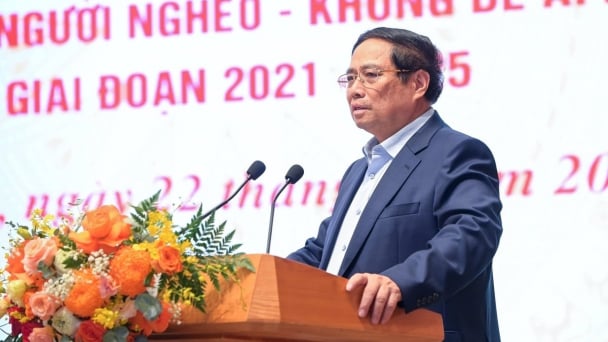June 23, 2025 | 21:25 GMT +7
June 23, 2025 | 21:25 GMT +7
Hotline: 0913.378.918
June 23, 2025 | 21:25 GMT +7
Hotline: 0913.378.918
Mr. Le Van Thu, Director of the sub-Department of Fisheries Surveillance Region V said at the regular meeting of the Vietnam Fisheries Resources Surveillance (VFRS) in November 2022 that in the first 10 months of the year, the sub-Department deployed 16 patrols, inspections, and handling violations of the law on fisheries at sea.
The violations were mainly about the lack of certificates, documents and vessel insurance dossiers. During the patrol, the working groups discovered and called for 8 fleets of fishing boats and fishermen in bordering areas to return to Vietnam's waters and asked them to sign commitments not to violate foreign waters.

The Vietnam Fisheries Resources Surveillance held a working session in November and deployed its work tasks in the last months of 2022. Photo: Minh Phuc.
According to the sub-Department of Fisheries Surveillance Region V, in the first 10 months of 2022, Vietnamese fishing boats were discovered repeatedly operating in the waters bordering Cambodia so the fishing patrol forces had to ask them to return to Vietnam. The same situation occurred in the waters bordering Malaysia but when the fishing patrol forces had left, some boats continued to violate.
In the waters of the Gulf of Tonkin, Mr. Dinh Van Trang, Director of the sub-Department of Fisheries Control Region I, said: "In the first months of 2022, the phenomenon of foreign fishing vessels violating Vietnamese water sovereignty still happened. When patrolling and detecting, the fisheries control force had propagated and disseminated them about the law and required them to leave Vietnamese waters.
Mr. Trang emphasized that in the past two years, the maritime patrol, control and inspection had been deployed since the first months of the year (previously, it was not until May and June).
He said the sub-department recommended the competent authorities to soon issue a working plan in 2023 for the fisheries surveillance force; approve estimated finance and provide funding from the state budget right in December 2022 so that the units can carry out their assigned tasks at the beginning of the year preventing Vietnamese fishing vessels from violating foreign waters.
Mr. Nguyen Phu Quoc, Deputy Director of the VFRS, said in the first 10 months of 2022, patrolling, inspection, control and handling of violations of the law on fisheries at sea had been enhanced. The number of cases sanctioned for administrative violations had increased over the same period in 2021.
Mr. Nguyen Quang Hung, Deputy Director of the Directorate of Fisheries and Director of the VFRS requested the two regional Fisheries Surveillance Sub-Departments to carry out patrols, inspections and control at sea according to plan of the last months of the year,
In particular, he urged strengthening the handling of violations, recording in detail the operation of fishing vessels at sea, especially foreign ones operating in Vietnamese waters. When detecting violations, it is necessary to strictly punish to ensure deterrence.
In addition, sub-departments need to track down the violating vessels and report fully information and data to the Directorate of Fisheries, Ministry of Agriculture and Rural Development (MARD). Since then, the MARD will coordinate with law enforcement forces at sea to find prevention solutions.

In the past two years, the patrol, control and inspection at sea by the fisheries surveillance forces have been deployed since the first months of the year due to early funding.
Mr. Hung also said, recently, the inspection team of the European Commission (EC) noted that the rate of sanctioning administrative violations related to IUU fishing is still very low compared to the total number of 800 cases reported by the VMS.
"We have had nearly 5 years of campaigning, propagating and reminding fishermen to comply with the law on fisheries, but if we do not strictly handle violations, we cannot create a deterrent," said Mr. Hung.
Report No. 52 of the Ministry of Justice makes it difficult for fishery control activities
On October 17, 2022, the Ministry of Justice issued Report No. 52/TTr-BTP on the promulgation of the Government's Resolution on a number of tasks and solutions to deploy and reorganize the apparatus of ministries and agencies and agencies attached to the Government.
In Part III (main content of the draft Resolution) states: " For the competence to sanction administrative violations: The draft Resolution identifies that in case when the General Department is reorganized into departments, sub-departments and agencies is reorganized, sanctioning administrative violations of the General Departments and Departments will be performed by the Inspectorate of the Ministry until there are new regulations to replace it."
The draft Resolution assigns ministries, ministerial-level agencies, and government-attached agencies to review and classify titles that have sanctioning competence but have changes in their duties and powers when implementing the plan to rearrange and re-organize administrative organizations; to specifically propose amendments and supplements to the competence of sanctioning administrative violations in the Decrees on sanctioning of administrative violations.

In addition, regarding the performance of specialized inspection functions, the draft Resolution states: “In case the General Department is reorganized into departments and agencies; or the Department under the Ministry is reorganized into a Department, the specialized inspection function of the General Departments and Departments will be performed by the Inspectorate of the Ministry until there are new regulations to replace it."
According to Mr. Nguyen Phu Quoc: “The Fisheries Surveillance Force performs the function of patrolling, inspecting, controlling, detecting and handling violations of the law and specialized inspection of fisheries in all Vietnamese sea areas”.
This is a regular and continuous task to enforce the law on fisheries in Vietnam's waters. The specific characteristics of the area where patrol, inspection, control and specialized inspection by the fisheries surveillance forces are carried out in the sea far from the mainland.
Therefore, if the performance of the administrative sanctioning function and the specialized inspection function of the Vietnam Fisheries Resources Surveillance and Directorate of Fisheries is carried out by the Ministry Inspector (in particular, the Inspectorate of the MARD) until there is a new regulations, the activities of the Vietnamese fisheries surveillance force were almost paralyzed.
As one of the purposes of maritime patrol is to conduct specialized inspection of fisheries and detect, prevent and handle violating fishing vessels, if specialized inspection and handling of administrative violations are not carried out, the fishery control forces... will almost run out of work to do!
Translated by Linh Nguyen

(VAN) Vietnam's national goal programs have effectively mobilized the combined strength of agriculture, farmers, and rural areas, thereby enhancing the material and spiritual well-being of the Vietnamese populace.

(VAN) The waste of resources from agricultural by-products and the situation of counterfeit and poor quality goods in production causing losses of thousands of billions were pointed out by the National Assembly deputy.

(VAN) After 5 years of implementation, the CAI initiative has helped coffee growers change their farming practices, moving toward responsible agriculture that meets global export standards.

(VAN) The primary prerequisite for the comprehensive and robust integration of Vietnam's livestock sector into the global value chain is the establishment of a disease control system.

(VAN) The results of national programs are essential for establishing a contemporary livestock sector that is well-equipped to meet the demands of both domestic and international markets, with robust biosafety standards.

(VAN) The UNESCO Global Geopark revalidation of Non nuoc Cao Bang and the transition to a two-tier administrative model are presently undergoing a pivotal moment in Cao Bang, the northernmost province of Vietnam.
/2025/06/13/5330-2-004539_953.jpg)
(VAN) Changing policy mindset and removing investment barriers are urgent requirements to open up new development space for enterprises in the agricultural sector.